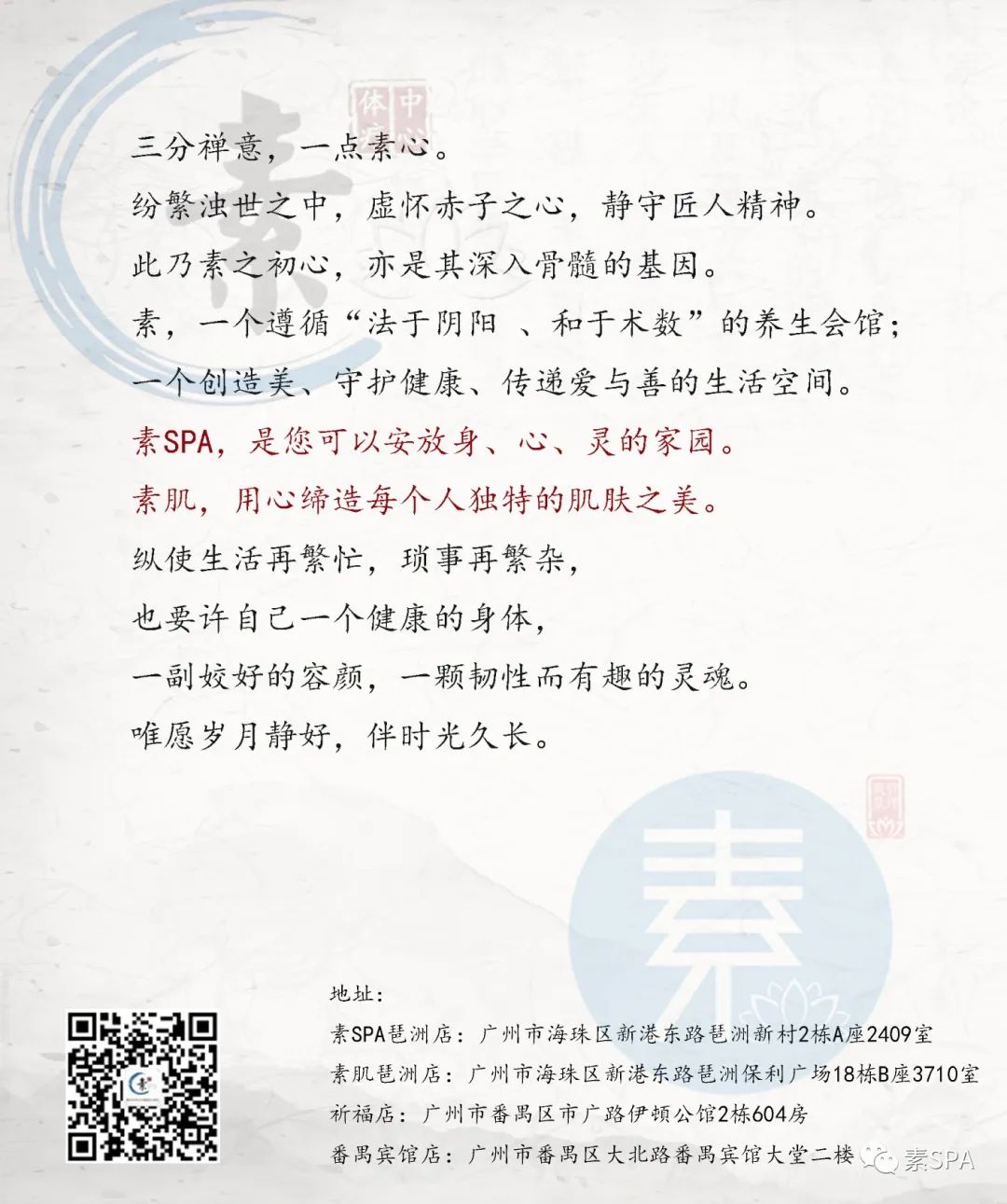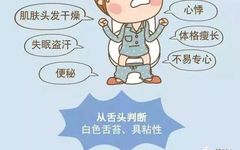
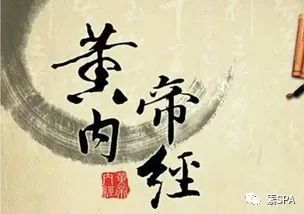
Huangdi Neijing: Suwen
“I have heard that in ancient times, people lived to be a hundred years old in both spring and autumn, and their movements did not decline; whereas today, people at fifty years old show signs of decline. Is it due to the changing times? Or is it a loss on the part of the people? Qibo replied: In ancient times, those who understood the principles followed the laws of Yin and Yang, harmonized with the techniques, had moderation in food and drink, maintained regularity in daily activities, and did not engage in excessive labor, thus they could maintain both body and spirit, living to a full lifespan of a hundred years.”
Modern people often overwork their minds, stay up late, and over time, this leads to Yin deficiency, heat, and depletion of energy, akin to the ancient saying “the oil is exhausted and the lamp is dry.” There are many individuals with a Yin deficiency constitution. Those with a Yin deficiency often experience symptoms such as hot hands and feet, dry mouth, and irritability, which pose significant threats to our health.
What exactly is a Yin deficiency constitution? How should it be regulated?
What is Yin Deficiency?
Yin deficiency primarily refers to the loss of body fluids. When the body lacks sufficient fluids, it loses the necessary moisture and nourishment, leading to symptoms of dryness in individuals with a Yin deficiency constitution, such as weight loss, a reddish complexion, dry mouth and tongue, and excessive thirst despite drinking a lot of water, all of which are manifestations of dryness due to insufficient Yin fluids.
The imbalance of Yin and Yang in the body prevents Yin energy from restraining Yang heat, resulting in an excess of Yang heat and the generation of internal heat, thus leading to the emergence of false fire. Therefore, individuals with a tendency towards Yin deficiency often exhibit extroverted personalities, quick movements, and rapid reactions. However, they may have poor self-control, be overly excited, and display characteristics such as restlessness and irritability.
Individuals with this constitution tend to be sensitive to heat and prefer coolness, have strong resistance to cold, and are easily harmed by summer heat and Yang pathogens. Their skin is prone to sores and ulcers, and they are more likely to develop fevers when ill, regardless of whether they are affected by external wind, cold, heat, or dampness, which ultimately transforms into heat symptoms, presenting as dry mouth, thirst, irritability, and other signs of excessive Yin deficiency fire. If these initial symptoms of excessive Yin deficiency fire are not properly regulated, or if one continues to consume foods that generate phlegm and heat or promote diuresis, such as scallions, ginger, garlic, and chili, or mistakenly uses tea to reduce heat, or consumes red beans, coix seeds, and other diuretic foods, it will exacerbate the depletion of Yin fluids in the body.
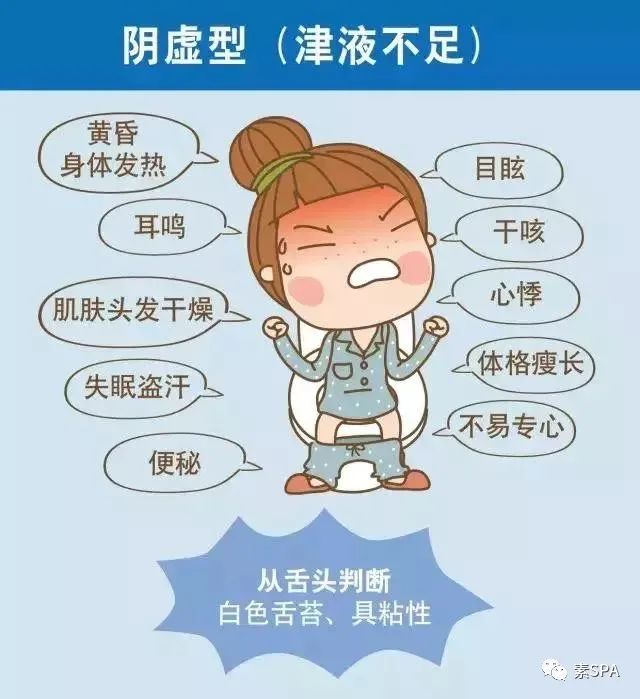
Different Organs Exhibit Different Symptoms of Yin Deficiency
Dryness affecting different organs will manifest different symptoms of Yin deficiency:
If Kidney Yin is Damaged
Symptoms include dizziness, tinnitus, weakness in the lower back and knees, hair loss, loose teeth, insomnia with vivid dreams, night sweats, heat in the five hearts, dry throat and red cheeks, red tongue with little moisture, and a thin rapid pulse. In men, there may be nocturnal emissions, while women may experience irregular menstruation or amenorrhea. This can be caused by various factors such as chronic illness damaging the kidneys, excessive sexual activity, heat illness damaging Yin, or overconsumption of warming and drying substances.
If Lung Yin is Damaged
Initially, symptoms may include dry lips, dry throat, and hoarseness. If not regulated in time, it may progress to a dry cough with little phlegm or, in severe cases, blood-streaked phlegm. This is often due to chronic cough damaging Yin or damage to Yin fluids in the later stages of heat illness.
If Heart Yin is Damaged
Symptoms include insomnia, vivid dreams, palpitations, forgetfulness, irritability, night sweats, heat in the five hearts, dry mouth and throat, red tongue tip, little coating, and a thin rapid pulse. There may also be redness in the cheeks, irritability, dizziness, and other symptoms of excessive false fire. These conditions are often seen in individuals with insufficient liver and kidney function, true Yin deficiency, or those who have not recovered from Yin damage after heat illness. In modern society, due to high work pressure, excessive thinking can deplete heart blood, leading to heart Yin deficiency.
If Spleen Yin is Damaged
Symptoms include loss of appetite, bland taste in the mouth, bloating after eating, weight loss, fatigue, little saliva, dry lips, bright red lips, heat in the five hearts, dry and hard stools, short and red urine, red tongue with dry thin coating or no coating, and a thin rapid pulse. Such children are often very active, some may not stop moving, and may even have a bad temper and be prone to anger.
If Stomach Yin is Damaged
Symptoms include hunger without appetite, a phenomenon referred to in ancient texts as “hunger without desire to eat.” Sometimes it may also present as dry retching or belching. This is often due to chronic stomach illness, or Yin fluids not recovering after heat illness, or excessive consumption of spicy foods, or emotional distress leading to Qi stagnation and fire damaging Stomach Yin.
If Liver Yin is Damaged
Symptoms include dryness and blurred vision.
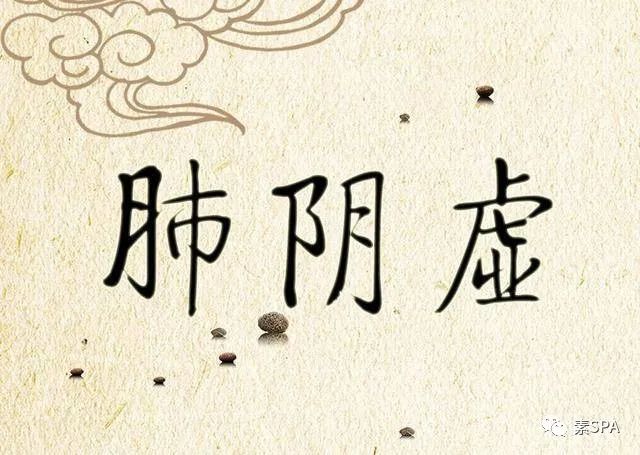
If Yin fluids are severely damaged and cannot restrain Yang energy, symptoms of excessive fire will appear, leading to inflammation. For instance, if the fire is in the lungs, it may cause pharyngitis, tonsillitis, or even pneumonia; if the fire is in the liver, it may lead to conjunctivitis, etc.
In modern society, due to excessive mental strain, many white-collar workers experience Yin deficiency. For example, many night owls have a high proportion of Yin deficiency among them.
Among these, the more significant condition is Spleen Yin deficiency, which refers to insufficient Spleen Yin fluids, leading to inadequate nourishment and weak transformation. This is often caused by external warm diseases depleting Yin fluids, or inherent Yin deficiency, or emotional distress leading to liver Qi stagnation, which burns Yin fluids, or excessive consumption of spicy foods, or mistakenly taking warming and drying medicines.
Recommended Foods for Regulating Yin Deficiency
Individuals with a Yin deficiency constitution should consume more foods that are nourishing and cooling, rich in moisture, and beneficial for Yin. Fresh vegetables and moist fruits are recommended. Avoid spicy and stimulating foods, warming and drying foods, fried or roasted items, foods that are hot and fiery, and foods high in fat.
Among the list of food and medicinal plants approved by the Ministry of Health for dual-use, Goji berries (Gouqi zi) are included as a Yin-nourishing food. Common foods like black sesame and mulberries are also classified as Yin-nourishing in pharmacology. Other common herbs such as Codonopsis (Dangshen), Polygonatum (Yuzhu), Lily Bulb (Baihe), Polygonatum odoratum (Huangjing), Ligustrum lucidum (Nvzhendzi), tortoise shell (Gui jia), and soft-shelled turtle shell (Bie jia) are also Yin-nourishing herbs. Additionally, foods like Tremella (Yin’er), sea cucumber (Hai shen), and pig skin (Zhu pi) have excellent Yin-nourishing effects. Especially during the dry autumn season, consuming more of these foods can prevent the depletion of Yin fluids and enhance resistance to external dryness.
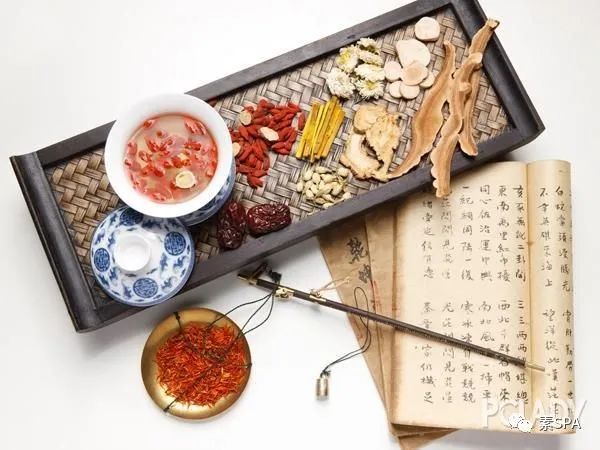
Here are several foods that are particularly suitable for individuals with Yin deficiency:
● Duck Meat
Nourishes Yin and benefits the stomach.
Famous Qing Dynasty physician Wang Mengying stated in his “Dietary Records of Suixi” that duck meat: “Nourishes the Yin of the five organs, clears the heat of deficiency, and nourishes the stomach and generates fluids.” It is commonly believed that duck is the ideal nourishing food for Yin deficiency. Recently, I reviewed the dietary records of Emperor Qianlong and found that he frequently consumed duck dishes, almost daily. He lived to be eighty-nine years old, the longest-lived emperor in history, and among the many factors, attention to dietary regulation should be an important one.
● Pork (Skin)
Pork has the effect of nourishing Yin and moistening dryness. Qing Dynasty physician Wang Mengying observed that blacksmiths working with iron were exceptionally dry and hot, yet remained healthy. When he inquired about the reason, the blacksmiths said they drank soup made from lean pork, which led Wang Mengying to understand the nourishing characteristics of pork. He stated: “Pork nourishes kidney fluids, replenishes stomach juices, nourishes liver Yin, moistens the skin, and alleviates thirst.” According to “Bencao Beiyao”: “Pork has a rich flavor, nourishes the intestines and stomach, generates fluids, and moistens the skin.” Therefore, it is suitable for those with a Yin deficiency constitution, with pork skin being even more effective. Zhang Zhongjing created the pig skin soup to moisten the throat and alleviate dryness, which is the beginning of this idea.
● Eggs
Not only do they benefit Qi and nourish blood, but both egg whites and yolks have the effect of nourishing Yin and moistening dryness. In the past, some Yin-nourishing herbal formulas would include an egg after cooking, as traditional Chinese medicine believes that egg yolk has a nourishing effect on Yin.
● Pears
They have the effects of generating fluids, moistening dryness, and clearing heat, making them particularly suitable for those with Lung Yin deficiency or those who have suffered Yin damage after heat illness. According to “Bencao Tongxuan”: “Ripe pears nourish the Yin of the five organs.” “Chongqing Tang Suibi” states: “For warm and dry diseases, and for those with Yin deficiency and excessive fire, juicing and drinking it is effective.” In old Beijing, there is a dessert called autumn pear cake, made with autumn pears and some Yin-nourishing herbs, which can nourish Yin and moisten dryness. Generally, supermarkets in northern regions may sell it, and regardless of the season, it can be consumed whenever there is a Yin deficiency condition. Additionally, in the past, when prescribing remedies for moistening the lungs and stopping coughs, some old TCM practitioners would recommend slicing a snow pear and cooking it with the herbs to achieve this effect.
● Mulberries
They have the function of nourishing Yin and replenishing blood, particularly beneficial for nourishing the Yin of the liver and kidneys. Ming Dynasty physician Miao Xiyong wrote in “Shennong Bencao Jing Shu” that it: “Is a medicine for cooling blood, replenishing blood, and benefiting Yin,” and also stated, “Thirst due to internal heat and insufficient fluids can be alleviated by generating fluids, benefiting the five organs due to their Yin nature.” Especially for those with liver and kidney Yin deficiency who experience thirst, dim vision, and tinnitus, consuming mulberries is most suitable. Recently, while on a business trip, I noticed that mulberry juice was offered on the airplane, which delighted me, as during the mulberry season, they are abundant and delicious, but once the season passes, they are hard to find. Now, if they can produce juice, it will help preserve them.
● Goji Berries
They have the function of nourishing Yin and benefiting essence, especially for symptoms such as lower back and knee weakness, dizziness, blurred vision, tinnitus, or for those with Lung Yin deficiency experiencing night sweats, fatigue cough, and diabetes-related thirst. Consuming them is even better. During the Republic of China, famous physician Zhang Xichun experienced thirst every night and placed a bowl of water by his bedside. In the morning, he found that he had drunk most of it. Later, he started eating a few goji berries before bed, and surprisingly, he no longer felt thirsty at night, demonstrating their nourishing and moisturizing effects.
● Bird’s Nest
It is neutral in nature, sweet in taste, and has the function of nourishing Qi and Yin, particularly beneficial for Lung Yin. It is an excellent nourishing food. For those with a Yin deficiency constitution, especially those with Lung Yin deficiency, such as tuberculosis, bronchiectasis, pulmonary atrophy, elderly bronchitis, and chronic bronchitis, it is most suitable. Qing Dynasty physician Zhang Lu stated that it can “regulate and nourish deficiency and treat cough with red phlegm.” “Bencao Zhaixin” also records that it “greatly nourishes Yuan Qi, moistens the lungs, and nourishes Yin.”
● Tremella
It has the effects of nourishing Yin, benefiting the stomach, and generating fluids to moisten dryness. Tremella is rich in nutrients and is one of the most commonly used nourishing foods, especially suitable for those with Lung Yin deficiency and Stomach Yin deficiency.
● Ejiao (Donkey-hide Gelatin)
It can both nourish blood and nourish Yin. According to “Bencao Gangmu”: “Ejiao primarily serves to nourish blood and fluids. For those with insufficient Yin, it can be supplemented with flavor; the sweetness of Ejiao nourishes Yin blood.” It is especially suitable for those with Lung and Kidney Yin deficiency.
Image source: Internet
Edited by: Su Spa
Recommended Reading:
Traditional Chinese Medicine: Foods to Eat for Health in Early Autumn, Simple and Affordable.
Traditional Chinese Medicine: If Meridians are Blocked, Nutrients Cannot be Absorbed, Eating Anything is Futile!
Traditional Chinese Medicine: The Truth! Women Age Faster than Men at 35!
